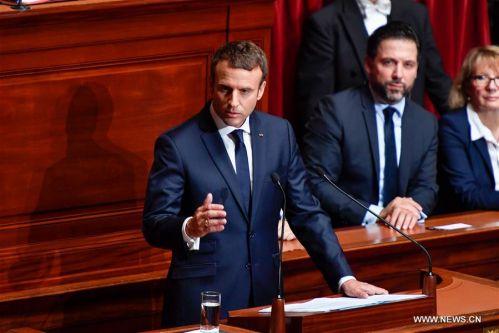
French President Emmanuel Macron (front) gives a speech during a session of both houses of parliament held in Paris, France, on July 3, 2017. French President Emmanuel Macron said Monday he would use referendums to press through his reforms on the country's institutions if parliament failed to approve them in one year. (Xinhua/Chen Yichen)
PARIS, July 3 (Xinhua) -- With "efficiency, representativeness and responsibility," French President Emmanuel Macron outlined his roadmap for the eurozone's second largest economy over next five years during which he says he wants to restore voter confidence and the country's sovereignty.
"The people have given us a mandate. I want to talk about the institutions that I want to change and the principles of actions I intend to follow," Macron said, "Commitments will be met, reforms will be done," he added.
Macron pledged to cut the number of lawmakers by a third, while promising to strengthen the parliament's means so that "work becomes more fluid."
Furthermore, he wants to remove the Court of Justice of the Republic, which handles government officials' trails, and instead further reinforce magistrates' independence.
"Laws are made to frame the deep trends of our country," he said, calling for effective institutions and less overall legislation.
In a 90-minute speech, Macron said he would resort to referendums if parliament does not vote major institutional reforms quickly enough.
"I hope that all the deep transformations, which I have just described and of which our institutions are in desperate need, are adopted within a year," he told parliament.
Macron also said he would lift the state of emergency, imposed in the wake of Paris attacks on November 2015, in autumn in order to "re-establish the freedom of the French."
"The penal code as it is and the powers of magistrates as they are can -- if the system is well ordered -- allow us to annihilate our enemies," he said.
Having never held elected office before, Macron won the French presidency on May 7.
He came under fire for convening a joint session of parliament, known as a congress, and vowed to transform it to an annual meeting, defying critics of concentrating too much power in the presidency.
Right-wing lawmaker Nicolas Dupont-Aignan said he was disappointed by the declaration that lacked "concrete" proposals.
Left-wing veteran Jean-Luc Melenchon, who leads the 17-strong "France Unbowed" group in parliament, boycotted the congress.
Prime Minister Edouard Philippe will give details on the president's economic and social project in the National Assembly on Tuesday.




 A single purchase
A single purchase









